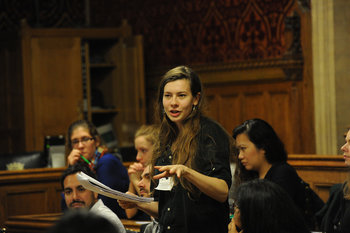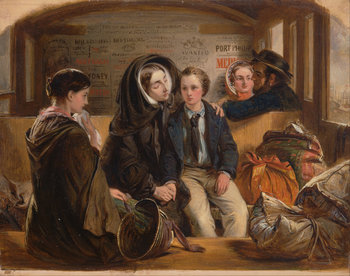
Needless Connotations
Attaching positive or negative connotations to a term that has a more objective phrasing. For example, referring to traditional media as "legacy media" in order to imply that it is out-of-date.Assuming The Solution
Describing a problem using phrases that assume something about the solution to the problem. For example, using "income inequality" to describe poverty. This implies that the solution to poverty is to make all income equal -- a core tenet of communism.Euphemisms
Using inappropriately positive terms for negative things. For example, describing bombing as "servicing the target."Stigma Labeling
Unfairly labeling others with stereotypes that have much negative stigma attached to them. For example, referring to people who are exercising their right to protest [freedom of speech, freedom of association, right to political participation] as "terrorists."Language Inflation
Using overly dramatic and emotional language whereby you rob language of its original meaning. A historical example of this is using the word "love" to describe everyday things such as "I love these socks." This cause the word love to lose its impact in describing intense human experiences and emotions.Political Correctness
Political correctness is often used in reasonable ways that seek the most respectful term for things. However, it can also be used to try to invalidate the language of your political opposition and to create new "correct" terms that signal allegiance to an ideology. This is essentially an attempt to compel others to use loaded language as the only language that is "correct."Virtue Words
Using phrases that are intended to signal your virtue. For example, saying "I'm going out for a [buzzwords for sustainability] lunch" instead of saying "I'm going out for lunch."Weasel Words
Weasel words are vague references to an anonymous authority such as "science", "experts" or "evidence-based" in order to present your own opinion. For example, "Our evidence-based approach is proven to work" -- without any reference to this evidence-based "proof."Loaded Questions
A loaded question includes an unjustified assumption. This is essentially a trap as it's easy to look like you are accepting these assumptions if you're not careful with your reply. For example, if asked "do you regret all your poor choices?" If you answer either "yes" or "no" to this question it looks like you accept the assertion that you made poor choices.Push Polling
Push polling is an attempt to influence with a fake survey or poll. For example, a political "survey" that asks "Are you concerned that America will lose 40 million jobs when ___ is elected?" This is an example of a loaded question.Shibboleth
A shibboleth is a word that is obscure or difficult to pronounce such that it is used for the purposes of socially including and excluding people. For example, an academic speech that uses intentionally obscure language that signals inclusion in an academic elite whereby a phrase is deliberately intended to exclude much of an audience.| Overview: Loaded Language | ||
Type | ||
Definition | Language that includes excessive or invalid assumptions or connotations. | |
Also Known As | Loaded TermLoaded Question | |
Related Concepts | ||




























